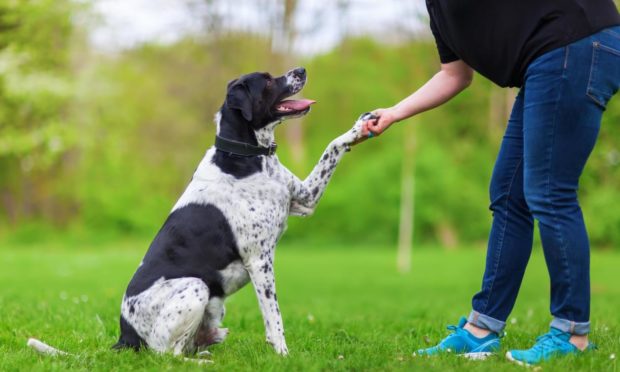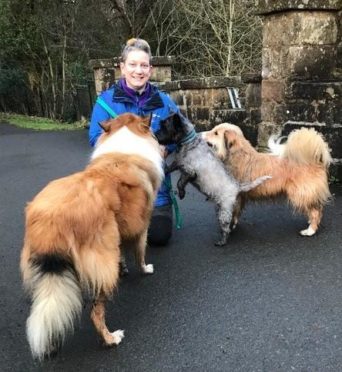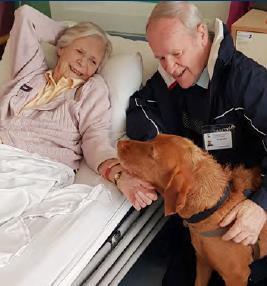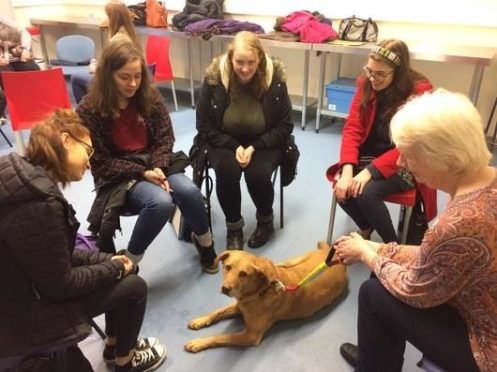Therapy dogs are preparing to return to the frontline, making visits across Tayside and Fife to those who need a little TLC from a four-legged friend.
Canine Concern Scotland runs therapet sessions across the country, including at venues across the Tayside and Fife areas, and visiting patients at Ninewells Hospital, too.
The charity is gearing up to resume in-person therapet sessions after more than a year of virtual visits to schools, colleges, universities, hospitals, care homes and more.
CEO Mel Hughes says: “I got started with the charity as a volunteer. My mum was in a care home, I took my dog in to visit her and I realised how much the residents were loving it.
“We have more than 1,000 dogs and eight cats that visit everywhere from Orkney, right the way down to Dumfries and Galloway and all across the borders.”
A therapet is an animal – usually a dog – taken in to various venues to provide comfort to those who would benefit from a visit.
They bring distraction, affection, companionship, joy and have been shown to have benefits on mental health and wellbeing.
Mel continues: “Anybody who has an animal knows that at the end of the day, your pet greets you no matter what kind of day you’ve had, no matter what sort of mood you’re in.
“The animal is usually so pleased to see you and you get a very good welcome. That stimulates in you all the chemicals that make you feel better and happy. So you’re combating those feelings of stress and anxiety and depression.”
Due to the pandemic, Canine Concern Scotland’s services have had to be adapted, but that hasn’t stopped them from holding virtual sessions for those who need them. The team of volunteers have also been getting creative in their support.
Mel explains: “At Christmas, we had volunteers who made up little photo books of their dog doing different activities.
“They then sent that to one of the care homes and that way it could be passed around different residents.
“So, even if they weren’t able to facilitate a Zoom session with the dogs, they could still pass round a book and they could use that as stimulus for talking about the dog and spark conversation with those who have dementia about pets they had.
“When they couldn’t have visits from family members and weren’t getting that contact, it was these things that would help stimulate memories and help the staff with something to do if they weren’t allowed to have people in.”
Though there’s no official date as to when services can resume, Canine Concern Scotland’s volunteers and their furry friends are raring to get back to work, and will continue hosting virtual therapy sessions until they can make in-person visits once again.
Mel says: “We’re not considered an essential service so we are waiting for clearer guidance on getting back to work.
“At the moment it’s not there yet, although the country is starting to open up a little bit, but we have a duty of care to our volunteers and those we support.”
During the pandemic @TherapetC 𝐉𝐞𝐬𝐬𝐢𝐞 has been taking part in 𝐯𝐢𝐫𝐭𝐮𝐚𝐥 𝐯𝐢𝐬𝐢𝐭𝐬 @keltyps in 𝐅𝐢𝐟𝐞.
Helped by 𝑪𝑪𝑺𝑻 𝒗𝒐𝒍𝒖𝒏𝒕𝒆𝒆𝒓 𝑴𝒐𝒊𝒓𝒂 𝑴𝒂𝒄𝑷𝒉𝒆𝒓𝒔𝒐𝒏 they have been making online visits to 𝑲𝒆𝒍𝒕𝒚 𝑷𝒓𝒊𝒎𝒂𝒓𝒚 𝑺𝒄𝒉𝒐𝒐𝒍 for the pupils pic.twitter.com/ni4HDwOXjZ— @Therapet-CCST (@TherapetC) March 24, 2021
The physical, mental and emotional benefits of therapets can be transformative, and the sooner these four-legged friends can resume visits to those who need them, the better.
Mel concludes: “We go into stroke wards and the dogs work with patients.
“When you have physiotherapists and occupational therapists saying they’ve been working with a patient, trying to help them to use their arm and they were getting so frustrated, but the minute you bring a dog in they forget and really try to use their arm to pat the dog.
“It’s the little things like that, it just makes a huge difference.”



